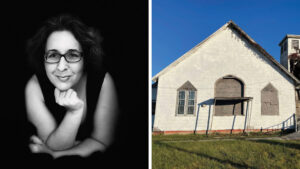“The Family Mashber”
By Der Nister, translated by Leonard Wolf
NYRB Classics, 688 pages, $22.95
In recent years, there has been a resurging interest in Yiddish, with many younger scholars working to preserve the language’s rich and complex heritage. In the broad realm of pop culture, however, Yiddish still functions largely as a vehicle for evocative insults or folksy, humorous tales. Think “Fiddler on the Roof” or the stories of Chelm.
Der Nister’s classic masterpiece “The Family Mashber” — immensely ambitious, stirring and strange — helps put the lie to this reductive view. Written in the late 1930s, the novel takes place in 19th-century Poland and has the intimacy of a family saga, with the social insight, epic sweep and slightly otherworldly quality that imbues so many great works of the early 20th century.
“The Family Mashber” centers on three brothers — Moshe, Luzi and Alter — and radiates outward to encompass the predominantly Jewish town of “N.” Moshe, the eldest, is a prosperous merchant. Luzi has turned away from worldly things and is a devoted member of a mystical Chasidic sect. Alter, the youngest Mashber brother, was a genius in his youth but now can barely function or communicate. Then there is Sruli Gol, an uncouth iconoclast. Though Sruli is not related to the brothers, his shadow looms large over the Mashber fortunes.
The word mashber means crisis in Hebrew, and each main character faces one or more of his own. Moshe is tormented by visions of his mortality, and then faces a precipitous financial decline. Luzi grows close to a group of destitute believers, eventually becoming their leader. But this position of authority brings him into violent conflict with N’s religious establishment. Alter, living until now in secluded purity in an upstairs room in Moshe’s house, consumes himself in his attraction to the family’s kitchen maid. And Sruli Gol, who has forsaken his monetary and spiritual inheritances, wrestles with the idea that both of these may be useful after all.
Readers well-versed in the classics will recognize clear parallels to Fyodor Dostoyevsky’s “The Brothers Karamazov” — the three brothers with archetypal personalities; the irascible outsider; the questions of faith, commerce and the yearnings of the flesh.
Though Dostoyevsky fans will indeed find much to relish, Nister’s true kindred spirits lie closer to his own era. The novel’s numinous, unsettling quality calls to mind Franz Kafka, Max Frisch, even — in its bustling urban scenes — James Joyce.
“The Family Mashber” is a must-read for anyone interested in deepening his or her appreciation of Yiddish literature. The novel is challenging, disturbing, dazzling and deeply rewarding.
“The Family Mashber” is available at The Ivy Bookshop, 6080 Falls Road. The Ivy also hosts several literary and cultural events per month. March’s events include Pulitzer Prize-winning journalist Will Englund, discussing “March 1917,” an account of the Russian Revolution and America’s entrance into World War I, on Tuesday, March 14, at 7 p.m. A full list of events is available at theivybookshop.com.
Rebecca Oppenheimer is The Ivy Bookshop’s content manager and lead book buyer. She lives in Roland Park.





